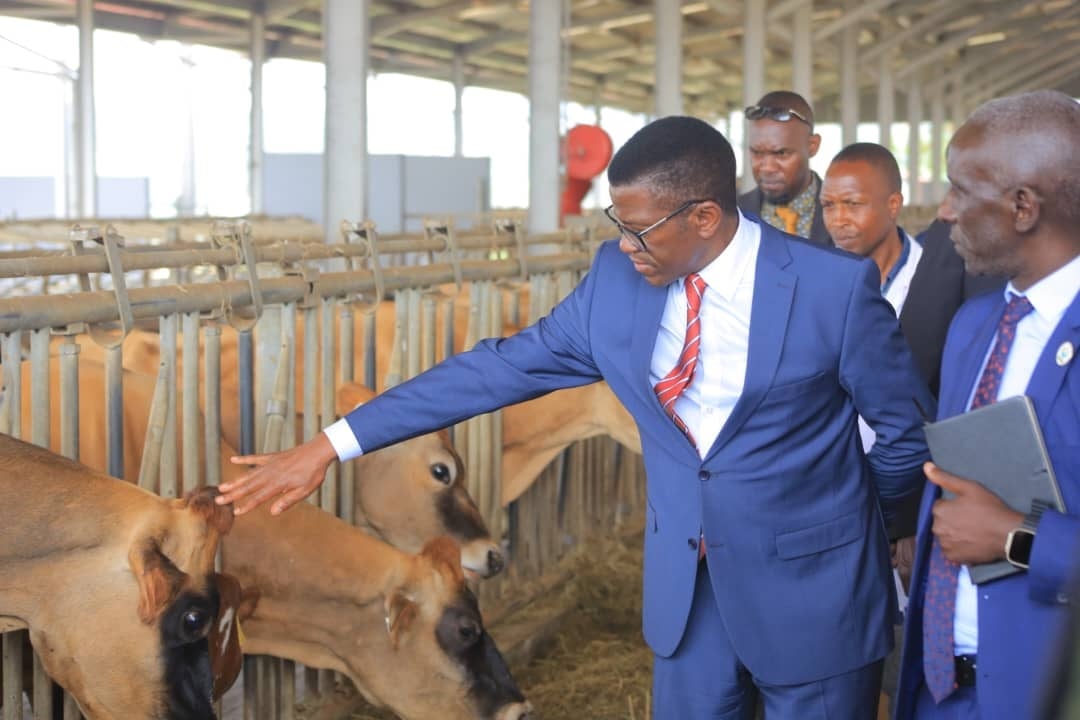Prime
Mayiga asks farmers to embrace new scientific-based approaches

The Katikiro of Buganda Charles Peter Mayiga inspects a new breed of cattle at Namulonge recently. Photo | Shabibha Nakirigya
What you need to know:
- Katikkiro of Buganda Kingdom Charles Peter Mayiga says that through science, there will be food security at the household level and some for sale, which will reduce poverty levels.
The Katikkiro (Prime Minister) of Buganda Kingdom Charles Peter Mayiga has urged farmers to start embracing new scientific and research based approaches, saying is the only way to increase our productivity in farming.
He made the remark while touring the four institutes of the National Agricultural Research Organisation (Naro), where he expressed admiration at the collection of advanced research products.
Agreement
The Katikkiro‘s visit was aligning with a memorandum of understanding signed between the research body and the Kingdom of Buganda last year. The partnership focuses on collaborative efforts to leverage Naro’s expertise in advancing transformative agriculture in the Buganda region.
“If we aim for socio-economic transformation, we must concentrate on our country’s comparative advantage, which lies in agriculture because it is important to embrace scientific and research-based approaches to agriculture in today’s era,” he said.
He added that with the population explosion and the growing list of needs, the country must embrace Naro because they have exhibited commitment to conduct all the required research to come up with new varieties in farming.
Katikkiro tips Naro
“We have witnessed Naro scientists showcasing innovative products such as coffee powder, yoghurt, wines, chocolate, cookies, cakes, and various non-dietary prototypes including lip balm, aftershave, facial scrub, and body lotions and creams and this shows that our local products will soon compete on international market,” he said.
He noted that as traditional institutions they have a big role in promoting coffee production and fostering technology and value innovation.
When the Katikkiro visited the Mukono Zonal Agricultural Research and Development Institute (MuZARDI) he explored adaptive research results aimed at promoting local poultry farming, vegetable and legumes cultivation, fish farming, quality seeds, and proper agricultural management practices.
Zero waste
He also applauded the zero waste farm management practices at the National Livestock Resources Research Institute (NaLIRRI) after observing the process how farm waste is utilised to produce various items, including biogas, bio-briquettes, biomethane, bio-liquid, bio-pesticides, bio-fertilisers, animal feeds, bio-electricity, carbondioxide, and sulphuric acid.
“I am impressed with the National Agricultural Research Laboratories (NaRL) in Kawanda, after witnessing the generation of banana plants through tissue culture. The experts have also showcased soil analysis for the greater Masaka region and the transformation of banana fibers into quality hair extensions,” said Mayiga.
He also noted that the institute has exhibited extension to agro-mechanisation, with the display of motorised and manually operated maize shellers and a motorised forage cutter, among other technologies which will ease the production process.
The Katikkiro also directed Buganda Cultural Development Foundation (BUCADEF) to initiate a programme that disseminates Naro technologies to communities, aiming to spark rapid socio-economic transformation not only in Buganda region but across the country.
The Naro Director General, Dr Yona Baguma, called for promoting four key sectors which include, coffee, banana, livestock, and local chicken farming—through BUCADEF saying it will drive socio-economic change within Buganda region.
“We need to collaborate and advocated for the widespread adoption of high-density crops specifically designed to address nutritional deficiencies in children and breastfeeding mothers such as beans and sweet potatoes, due to their high Vitamin A content,” he said.
He urged the kingdom to spearhead a purposeful initiative promoting the annual cultivation of a minimum of 100,000 trees in each county.
“I urge BUCADEF and Muteesa 1 Royal University to have a collaborative efforts to conduct outreach programmes, facilitating the dissemination of Naro technologies throughout Buganda and exploring the integration of these technologies into cultural events as a means of enhancing their visibility and impact,” he said.
The Minister of State for Agriculture, Trade, and Cooperatives in the Buganda Kingdom, Mr Amis Kakomo, hailed the partnership with Naro as a monumental step saying that the confidence in Naro’s ability to propel Buganda towards significant socio-economic development will support farmers to increase their productivity.
Other products made by Naro include: liquid soap, hand wash gels, pesticides, and animal feeds, all produced from cow dung, to facial and body scrubs, as well as body creams derived from coffee.




